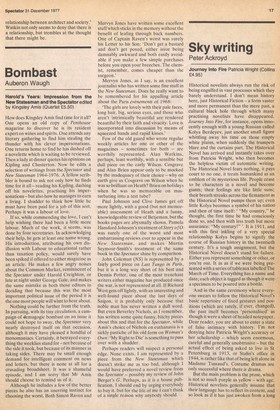Bombast
Auberon Waugh
Harold's Years: Impression from the New Statesman and the Spectator edited by Kingsley Amis (Quartet £5.50) How does Kingsley Amis find time for it all? One opens an old copy of Penthouse magazine to discover he is its resident expert on wines and spirits. One attends any literary gathering to find him stealing the thunder with his clever impersonations. One returns home to find he has dashed off a novelette which is waiting to be reviewed. Then a lady at dinner quotes his opinions on Kipling and Chesterton. Now he edits a selection of writings from the Spectator and New Statesman 19644976. A fellow scribbler is bound to ask not only how he finds time for it all — reading his Kipling, dashing off his novelettes, practising his impersonations—but also how he manages to earn a living. I shudder to think how little he must have been paid for a job of this sort. Perhaps it was a labour of love.
If so, while commending the love, I can't help wishing there had been a little more labour. Much of the work, it seems, was done by four secretaries. In acknowledging their help, he gets at least one name wrong. His introduction, attributing his own disillusion with Labour to educational rather than taxation policy, would surely have been spiked if offered to either magazine as an article. He makes a few angry noises about the Common Market, reminiscent of the Spectator under Harold Creighton, or late at night under George Gale, and makes the same mistake as both those editors in deciding that because this was the most important political issue of the period it is the one most people will 'Want to hear about.
Nothing could be further from the truth. In pursuing, with its tiny circulation, a campaign of demagogic bombast on an issue it could not hope to sway, the Spectator very nearly destroyed itself on that occasion, although it may have pleased a handful of monomaniacs. Certainly, it betrayed everything the weeklies stand for —not because of the side it took, but because of its manner in taking sides. There may be small enough demand for intelligent comment on news and letters, but there is none at all for a crusading broadsheet. It was a shameful episode, and I am sorry that Mr Amis should choose to remind us of it.
Although he includes a few of the better pieces he also has an unerring instinct for choosing the worst. Both Simon Raven and Mervyn Jones have written some excellent stuff which sticks in the memory without the benefit of leafing through back numbers. One of Captain Raven's worst was surely his Letter to his Son: 'Don't get a bastard and don't get poxed, either issue being damnably awkward and both easily avoidable if you make a few simple purchases before you open your breeches. The chemist, remember, comes cheaper than the surgeon.'
Mervyn Jones, as 1 say, is an excellent journalist who has written some fine stuff in the New Statesman. Does he really want to be remembered for his appalling article about the Paris evenements of 1968: 'The girls are lovely with their pale faces, long hair, big, serious eyes, and those who aren't intrinsically beautiful are rendered beautiful by their faith and vivacity. Love is incorporated into discussion by means of squeezed hands and rapid kisses.'
Few of the old guard who wrote regular weekly articles for one or other of the magazines — sometimes for both — are worthily represented. Alan Watkins, perhaps, least worthily, with a sensible but dull piece on the early Wilson. Cosgrave and Alan Brien appear only to be mocked by the inadequacy of their choice — why on earth give us Cosgrave on Wilson when he was so brilliant on Heath? Brien on holidays when he was so memorable on masturbating into a test tube?
Paul Johnson and Clive James get off more lightly, with a good (but not memorable) assessment of Heath and a funny, knowledgeable review of Betjeman, but the books pages are abysmally shown. Pamela Hansford Johnson's treatment of Story of 0, was surely one of the worst and most embarrassing reviews ever to appear in the New Statesman, and makes Martin Seymour-Smith's treatment of the same book in the Spectator shine by comparison.
John Coleman (NS) is represented by a fairly good piece on Last Tango in Paris, but it is a long way short of his best and Dennis Potter, one of the most trenchant writers either magazine has produced since the war, is not represented at all, If Richard West gets off lightly, with an interesting and well-found piece about the last days of Saigon, it is probably only because that noble man has never written a dull word. But even Beverley Nichols, as I remember, has written some quite funny, bitchy pieces about this and that for the Spectator, wli ile Amis's choice of Nichols on euthanasia is a sickly pastiche of his old form on Woman's Own: 'My Right to Die' is something to pass over with a shudder.
Perhaps readers will suspect a personal edge. None exists. I am represented by a piece from the New StateSman which doesn't strike me as too bad, although I would have preferred a novel review from the Spectator — possibly my review of John Berger's G. Perhaps, as it is a house publication, I should end by urging everybody to buy it. but for the life of me I can't think of a single reason why anynody should.






































 Previous page
Previous page